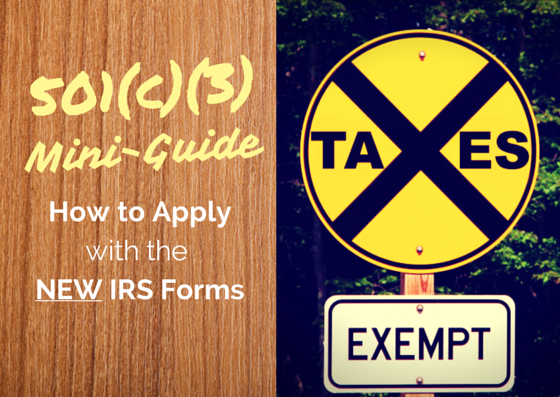How to Apply for 501(c)(3) Tax Exempt Status
You can apply for 501(c)(3) tax exempt status for your nonprofit by filing Form 1023 or Form 1023-EZ with the IRS. This mini-guide will take you through each option with instructions on how to file successfully.
Everything changed July 1, 2014
For years, there had been one way to apply for 501(c)(3) tax exemption, and that
was by filing form 1023. That all changed in July of 2014 when the IRS released Form
1023-EZ, a shortened application designed to streamline the 501(c)(3) application
process. While Form 1023-EZ is shorter and is processed by the IRS in less time,
many nonprofits still file Form 1023. An organization's eligibility and the complexity
of its activities are just a couple of considerations in choosing which form to file.
This guide will give you an overview of each form and help you better understand
the applications for tax exemption.
If you're applying for exemption under a different Section of 501c, you will file IRS
Form 1024.
IRS Form 1023
IRS Form 1023 is the traditional form used to apply
for 501(c)(3) tax exemption. Until the recent release of
Form 1023-EZ, this was the only way you could apply.
Form 1023 is a long and complex application. However, if your organization is granted 501(c)(3) tax
exemption, the benefits are well worth the effort.
The fee for the IRS Form 1023-EZ is $275, while the fee for the traditional IRS Form 1023 is $600.
By the time you assemble Form 1023 and supplements, your submission package will contain:
- Form 1023 Checklist
- Application (Form 1023 and Schedules A through H, as required)
- Narrative description of activities
- Organizing document (e.g. Articles of Incorporation)
- Amendments to organizing document in chronological order
- Employer Identification Number (EIN)
- Bylaws and policies, such as a conflict of interest policy
- All other attachments, including explanations, financial data, and printed materials or publications. Label each page with name and EIN.
Depending on your activities and filing needs, you may need to include additional documents as outlined
on the checklist.
When you're ready to submit your filing, mail IRS Form 1023, your user fee, and accompanying information
to:
Internal Revenue Service
P.O. Box 192
Covington, KY 41012-0192
Processing times for this form vary, but the IRS does explain how soon charities should expect to hear from them.
IRS Form 1023-EZ
Form 1023-EZ, used for eligible organizations, is much
shorter, and must be filed online. The fee for IRS Form 1023-EZ is always $275.
The IRS will recognize your organization's exemption only if you meet the eligibility criteria outlined
in the form's instructions.
In order to file Form 1023-EZ, you will need:
- To complete the form's Eligibility Checklist
- Approved Articles of Organization with appropriate IRS-required provisions
- Bylaws or other rules of operation
- Employer Identification Number (EIN)
- To register an account on pay.gov
- A credit or debit card for payment
When you're ready to file Form 1023-EZ, select the form through the pay.gov website, and begin completing the form. You can save, close, and return to your work at any time.
Key Takeaways:
- There are two forms used for applying for 501(c)(3) tax exemption. Make sure you use the correct one.
- Review the Instructions to Form 1023-EZ carefully. Failure to do so may result in a rejected filing.
- Form 1023-EZ takes less time to file and to receive recognition of exemption, but your preparation is roughly the same.
- Make sure you budget for the $275 to $600 IRS fee.
Continue reading "IRS Form 1023"
This page was last fact-checked October 10, 2016.

You might also enjoy our Nonprofit Startup Guide.

Tax-Exempt in 2 Weeks!
Download the case study of how our client, Reform It Now, obtained 501(c)(3) tax exemption in only two weeks using the new IRS Form 1023-EZ!




